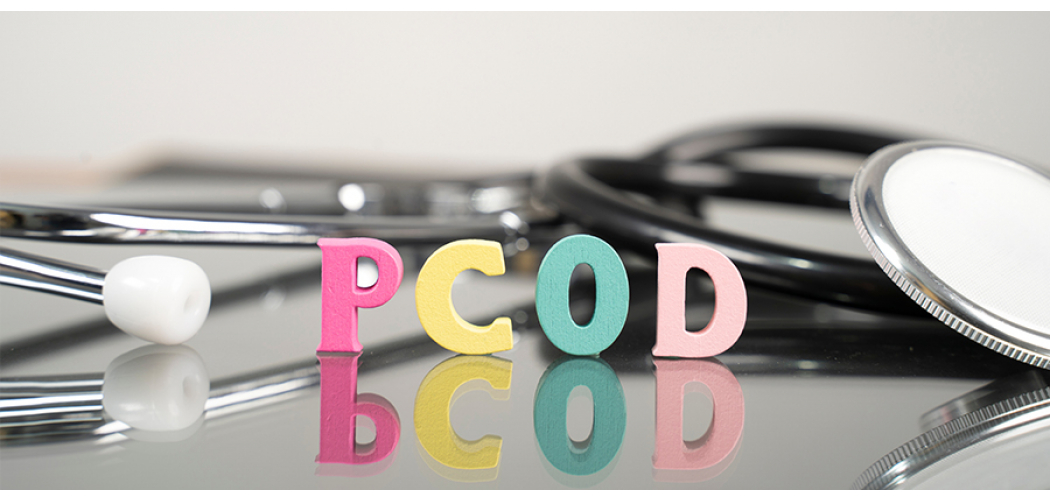Do you often get confused between PCOD and PCOS? Then you are not alone.
In this article you are going to get detailed information about PCOD & PCOS. So keep reading till the end.
What is PCOD?
In medical terms, PCOD is referred to as Polycystic Ovarian Disease. PCOD refers to a medical condition that occurs when a woman's ovaries produce immature or partially mature eggs. Over time, these eggs develop into cysts in the ovaries; however, an increase in male hormones (androgen) leads to the formation of several follicular cysts each month. It prevents eggs from being released regularly and causes anovulation.
Many women are unaware of PCOD's symptoms, its implications, or treatment options despite the fact that it's relatively common.
Let's examine it in more detail!
PCOD: What Problems Can It Cause?
PCOD symptoms often have a lasting impact on women's mental and physical health. PCOD is the most common problem among women, with about 34% also suffering from depression and nearly 45% experiencing anxiety. Therefore, diagnosing and treating PCOD symptoms early is essential to preventing future problems.
Poor quality of life is also experienced by many women diagnosed with PCOD because of:
- Disruption of eating and sleep patterns
- Low motivation
- Negative self-image
- Negative social relationships
- Mood swings
- Low self-confidence
What is PCOS?
PCOS, or polycystic ovary syndrome, is a hormonal condition that can affect women during their reproductive years. Your fertility can be affected by it. It can make it difficult for you to predict your periods or stop them. It can cause your skin to break out and grow unwanted body and facial hair. And in this condition you're more likely to develop other health problems, such as diabetes and high blood pressure.
PCOS: What problems can it cause?
- Period irregularities or no periods at all.
- Insufficiency or irregularity of ovulation (causing difficulty getting pregnant)
- An excessive growth of hair (hirsutism) - usually on the face, chest, back, or buttocks.
- Loss of hair and thinning of the hair on the head.
- Acne on the skin
- Weight loss
PCOD/PCOS Symptoms
If you have PCOD/PCOS, here are some common signs and symptoms to watch for.
- Heavy bleeding during periods
- Hair loss or male pattern baldness
- Excess body hair
- Difficulty in getting pregnant
- Acne
- Obesity
- Darkening of skin or pigmentation around the neck
- Depression
- Irregular or unpredictable menstrual periods
- Sleep disorders
There is no clear explanation for the cause of PCOD. The causes of PCOD can be both genetic and environmental, according to doctors. The following are common causes of PCOD/PCOS:
- There are several over-the-counter (OTC) medications and supplements available
- An unhealthy diet
- A sedentary lifestyle
- Pollution
- Hormone altering medication
Treatment
Treatment for PCOS focuses on treating individual concerns like infertility, hirsutism, acne, and obesity. You may need to change your lifestyle or take medication for treatment.
Lifestyle
It may be recommended by your doctor that you follow a low-calorie diet and exercise moderately in order to lose weight. A healthy weight loss program can also increase the effectiveness of medications prescribed by your doctor for PCOS, and reduce the risk of infertility.
Medications
Your doctor might recommend the following to help you regulate your menstrual cycle:
- Combined birth control pills- Progestin-estrogen pills reduce the production of androgen and regulate the release of estrogen. A hormone balance reduces your risk for endometrial cancer, abnormal bleeding and excess hair growth.
- Progestin therapy- Progestin can regulate your period and protect you from endometrial cancer when taken for ten to fourteen days every one to two months.
Your doctor might recommend the following to help you ovulate:
- Clomiphene- You take this anti-estrogen medication during the first part of your menstrual cycle.
- Letrozole and clomiphene- These medications promote ovulation
- Metformin - This medication lowers insulin resistance and helps you lose weight as well.
- Immature follicle aspiration- Improves ovulation by reducing immature follicles.
- Laparoscopic ovarian drilling - An ovarian drilling procedure is a minimally invasive procedure that lowers testosterone levels in the body.
Difference Between PCOD and PCOS
There might be some confusion among females about whether PCOD and PCOS are the same or different. The two conditions are related to ovaries and hormonal imbalance in women of reproductive age (between 12 and 51 years) and display similar symptoms.
The following are some differences between PCOD and PCOS every woman should be aware of:
PCOD | PCOS |
Ten percent of the world's female population suffers from PCOD. | Approximately 0.2% to 2.5% of the world's female population suffers from PCOS. |
A PCOD is a condition where the ovaries produce many immature or partially mature eggs as a result of poor lifestyle, obesity, stress, and hormonal imbalances. | Anovulation occurs when ovaries do not release eggs as a consequence of PCOS, which is a metabolic disorder. |
Women with PCOD are still able to ovulate and become pregnant with little assistance. Following medication, they will be able to carry the pregnancy to term. | Fertility is seriously affected by PCOS in women. PCOS makes it difficult for women to get pregnant because they cannot ovulate regularly.They may experience miscarriage, premature birth, or complications during pregnancy if they become pregnant. |
There is no serious complication associated with PCOD. | Type 2 diabetes, heart disease, high blood pressure, and endometrial cancer are serious complications of PCOS. |
PCOD and PCOS both respond well to weight-loss, a healthy diet, avoiding junk foods, processed foods, regular exercise. The conditions can be treated more effectively if they are diagnosed early.



 Login/Sign Up
Login/Sign Up





